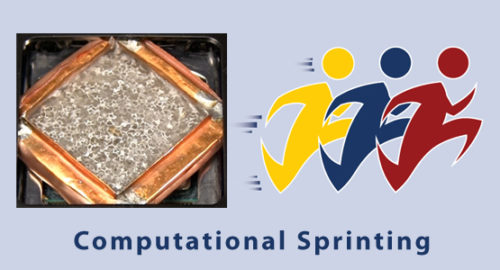CSE researchers win Best Paper Award at ASPLOS 2013

 Enlarge
Enlarge
A team of U-M researchers including CSE Prof. Thomas F. Wenisch, CSE Chair Marios Papaefthymiou, Prof. of Mechanical Engineering Kevin Pipe, and ME graduate student Lei Shao have won the Best Paper Award at the Eighteenth International Conference on Architectural Support for Programming Languages and Operating Systems (ASPLOS), which took place March 16-20, 2013 in Houston, TX.
Entitled “Computational Sprinting on a Hardware/Software Testbed,” the paper was authored by University of Pennsylvania graduate students Arun Raghavan and Laurel Emurian, along with Mr. Shao, Prof. Papaefthymiou, Prof. Pipe, Prof. Wensich, and Prof. Milo M. K. Martin of the University of Pennsylvania.
The paper notes that CMOS scaling trends have led to an inflection point where thermal constraints, especially in mobile devices that employ only passive cooling, preclude sustained operation of all transistors on a chip. It references recent related research by the team, in which they previously introduced the concept of “computational sprinting”, which is a technique for exceeding sustainable thermal limits for short intervals in order to improve responsiveness for the “bursty” computational demands from media-rich interactive mobile applications. For example, computational sprinting might be activated in an application that stiches together multiple photos into a composite work, or one that performs advanced face recognition, without the wait time now associated with such tasks.
Computational sprinting as previously proposed is intended to improve responsiveness by activating reserve cores (parallel sprinting) and/or boosting frequency/voltage (frequency sprinting) to power levels that far exceed the system’s sustainable cooling capabilities, relying on thermal capacitance to buffer heat. The prior work analyzed the feasibility of sprinting through modeling and simulation. That work was recognized with the best paper award at the 18th International Symposium on High Performance Computer Architecture in 2012.
In the new paper, the authors further investigate and prove out the concept of computational sprinting using a hardware/software testbed. First, they study unabridged sprints, wherein the computation completes before temperature becomes critical, demonstrating a 6.3x responsiveness gain and a 6% energy efficiency improvement by racing to idle. They then analyze truncated sprints, during which the software runtime system must intervene to prevent overheating by throttling parallelism and frequency before the computation is complete. To avoid oversubscription penalties (context switching inefficiencies after a truncated parallel sprint), they develop a sprint-aware task-based parallel run-time.
The researchers report initial results using a phase change heat sink to extend maximum sprint duration and demonstrate that a sprint-and-rest operating regime can actually outperform thermally-limited sustained execution.
Prof. Wenisch received his PhD in electrical and computer engineering from Carnegie Mellon University in 2007 and joined the faculty at Michigan that year. His research is focused on computer architecture with particular emphasis on multiprocessor and multicore systems, multicore programmability, data center architecture, and performance evaluation methodology. Prof. Wenisch was the recipient of an NSF CAREER award in 2009 and was named a Morris Wellman Faculty Development Assistant Professor of EECS in 2011. He was recognized in the International Symposium of Computer Architecture Hall of Fame in 2011 for having eight or more papers in ISCA. Prof. Wenisch is inventor on one patent and co-inventor on six patents.
Prof. Papaefthymiou is the Chair of Computer Science and Engineering at the U-M, and is co-founder and Chief Scientist of Cyclos Semiconductor, a startup company specializing in energy-efficient chips for power-critical applications. His research addresses a broad spectrum of problems in computer design with an emphasis on architectures and design methodologies for energy-efficient high-performance computers. He is also active in the field of parallel and distributed computing. Among other distinctions, Prof. Papaefthymiou has received faculty recognition awards from Yale College, the EECS Department and Graduate School at U-M, a Young Investigator Award from ARO, CAREER and ITR Awards from NSF, and several IBM Partnership Awards.
 MENU
MENU 
